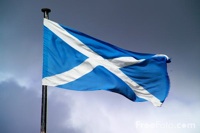
The Scottish government outlined plans today [Thursday] to hold a referendum on independence for Scotland next year.
The Referendum Bill is one of 13 proposed pieces of legislation that would be put before the Scottish Parliament, First Minister and SNP leader Alex Salmond said.
The proposal for a vote to be held in 2010 faces opposition from the British Labour Party and the Conservatives. While the referendum is thought unlikely to pass, a major political battle is expected over attempts to prevent the Scottish people even voting on the issue.
The SNP took power with a minority government in May 2007, narrowly defeating Labour, on a manifesto promise that it would call for a vote on the issue.
Mr Salmond told Members of the Scottish Parliament (MSPs) that independence was key to unlocking Scotland’s potential and to give it the best opportunity for future economic prosperity and to deal with global challenges.
“There is a glass ceiling at the present moment that threatens Scotland’s progress. For as long as limits are set of what we can do and what we can achieve, we will never achieve our full potential,” Mr Salmond said.
Moves by Scotland to achieve independence could have an effect in Ireland, where northern unionism faces the possibility of becoming further isolated from a rump British union of England and Wales.
It’s believed the legislation will come before the Scottish parliament in early 2010. If it passes, the public will vote later in the year.
Labour Lord George Foulkes said the referendum bill was “a political gimmick as the SNP know they won’t get it through. It’s also a distraction from the real issues that matter”.
The Scottish Tories issued a statement saying curtly: “We will not support Alex Salmond’s referendum bill.”
The Greens, however, said: “We are not opposed to a referendum. It is clearly time for the Scottish parliament to assume more powers.”
There are suggestions this week that the London government could attempt an intervention to prevent a referendum if it appears that it could be approved by the Scottish parliament.
A constitutional crisis could be triggered if Whitehall claims the referendum is ‘ultra vires’ - beyond the legal power and authority of the devolved Scottish government.
However, Mr Salmond told the assembled members of the Holyrood parliament today: “It is time for the people of Scotland to have their say. Not everyone will agree with our vision for the future but the people of Scotland must be heard. This parliament should not stand in their way.”
![[Irish Republican News]](https://republican-news.org/graphics/title_gifs/rn.gif)
![[Irish Republican News]](https://republican-news.org/graphics/title_gifs/harp.gif)

